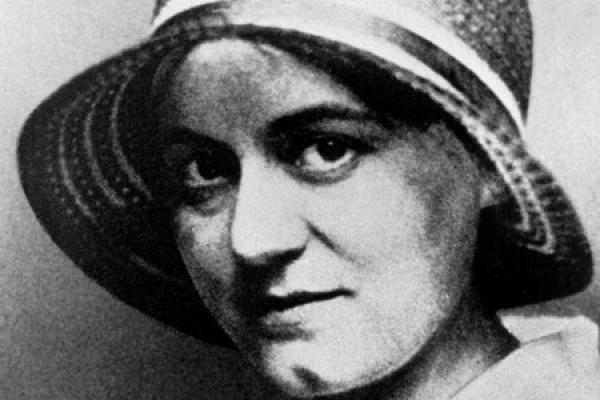On the 20th anniversary of her canonization, we have the opportunity to reassess St. Edith Stein’s life and legacy. Instead of remembering her simply as a tragic victim, we can take a deeper look at the work she undertook during her lifetime. Over the course of four decades, Stein dedicated her life to civic engagement and political resistance. From volunteering with the Red Cross in World War I, to participating in the women’s suffrage movement in Prussia, to fighting for equal educational opportunities for women, to writing against the rise of the Nazi regime, Stein is much more than the “Holocaust martyr” – she is the patron saint of political resistance.
Born into a Jewish family in Prussia in 1891, Edith Stein became a self-avowed atheist as a young woman and searched for meaning in philosophy, converting to Catholicism later in life. When the world went to war in July 1914, Stein’s life came to a jarring halt. She had worked hard to earn a place within the Gottingen Circle of Phenomenology – she was one of the few women to successfully do so. Yet, when she learned that Prussia had declared war and her male peers were enlisting, she did not hesitate to join the war effort. That very day, she settled her affairs, packed her bags, and returned to her hometown of Breslau (now Wrocław, Poland), where she registered as a volunteer nurse with the Red Cross.
However, Stein’s pipe dream of expertly serving on the front was far from fulfilled. The bright academic found the Red Cross’ training courses insufficient, so she took it upon herself to train outside of the classroom. She found study material in her sister’s medical library and assisted her sister during rounds at a local hospital. Despite Stein’s comprehensive preparation she still found herself without placement because the Red Cross had a surplus of volunteers.
It was not until April 1915 that Stein received an official placement with the Red Cross. Acting against her family’s wishes, she took a position at a lazaretto, or quarantined hospital. She was actually disappointed that she was not stationed closer to the front; nonetheless, she met a different kind of danger when she was assigned to the typhoid ward, a particularly dangerous placement and a fact she did not disclose to her family at home.
Stein’s service to the Red Cross was not a simple sign of patriotism, but an act of compassion for – quite literally – her enemies. The medical facility did not serve only Prussian soldiers, but any soldier in need of medical care. Stein was thus charged to care for not only her fellow countrymen, but also the very soldiers fighting on the other side of the trenches. Caring for those around her, no matter their national affiliations, she affirmed the innate humanity of each person in her charge.
As the war ended, Stein completed her doctorate and began her career search. However, her efforts to secure a faculty position at a German university were fruitless. Working in her favor were a strong recommendation from her mentor and the founder of modern phenomenology Edmund Husserl, as well as the significant research she had already conducted. However, universities were unwilling to consider an applicant who was both a woman and a Jew; through her connections at various universities, she learned that some of her applications actually went unread.
With her identity being a professional barrier, Stein advocated for female representation in the public sphere. She had long been a self-avowed suffragette; growing up, her friends teased that she would likely pursue high-ranking public office. Now a young adult, Stein joined the newly founded German Democratic Party to work for the inclusion of women in the local and national political scene. Even after women were granted the right to vote in 1919, she continued to volunteer with local political associations. She specialized in educating female voters and training women to become successful political candidates and effective political representatives themselves.
Over the next decade and a half, Stein became an expert in women’s formation and education. Instructing young women at a teacher’s training college, she encouraged her students to study politics, philosophy, and the natural sciences, disciplines to which many women at the time were not exposed. Stein’s theories on women’s education were published widely and she quickly become a popular speaker on the topic, invited to speak at academic and parochial conferences across Europe. Though some of her theories on women’s education may seem antiquated with the passing of time, many of her ideas are still revolutionary: she advocated for comprehensive sexual education for women and believed that women could thrive in any professional track, including, if so called, the priesthood.
Stein’s vibrant teaching career was cut short with the rise of the Nazi regime. Forcibly removed from her faculty position at a public research institution in 1933, Stein was at last able to act upon the sense of religious vocation she had felt since her conversion to Catholicism. After waiting for more than a decade, she entered monastic life as she took holy orders in the Carmel Maria of Peace in Cologne.
From behind cloister walls, Stein faced new barriers to her civic engagement. As a Jew, she was stripped of her citizenship and deprived of the right to vote, the very same right she had fought for as a young woman. Nonetheless, she continued her practice of political engagement by writing against the Nazi regime. In many of Stein’s theological texts from this period, she urged fellow people of faith to recognize the lack of Christian values in this tyrannical political hegemony.
In what is likely her most famous act, she wrote a letter to Pope Pius XI, calling him to decry the anti-Semitic, hate-fueled messages of the Nazi party. She never got a response.
READ: What If They Had Stopped My Family At The Border?
When we remember Stein simply as the “Holocaust martyr,” we limit her legacy to the – albeit tragic – circumstances of her death at Auschwitz on August 9th, 1942. However, Stein is not a holy woman because she died at the hands of tyrants. She is a saint because she spent four decades of her short life selflessly dedicating herself to serving others, changing political systems, and fighting against political inequality and injustice.
Stein provides a model of steadfast service and constant sacrifice. Even when Stein saw her life’s work crumble before her eyes, deprived of citizenship and suffrage in a nation she helped build, she continued to fight for justice. Stein provides us with a compelling example of the danger of reversing political progress, especially when civic and human rights are at stake. She challenges us to care for those suffering around us, even when they are our enemies, and to advocate for the rights, opportunities, and privileges of the marginalized in the face of tyranny. This is the legacy of the patron saint of political resistance.
Got something to say about what you're reading? We value your feedback!






